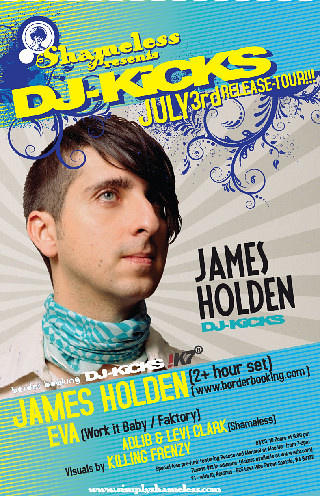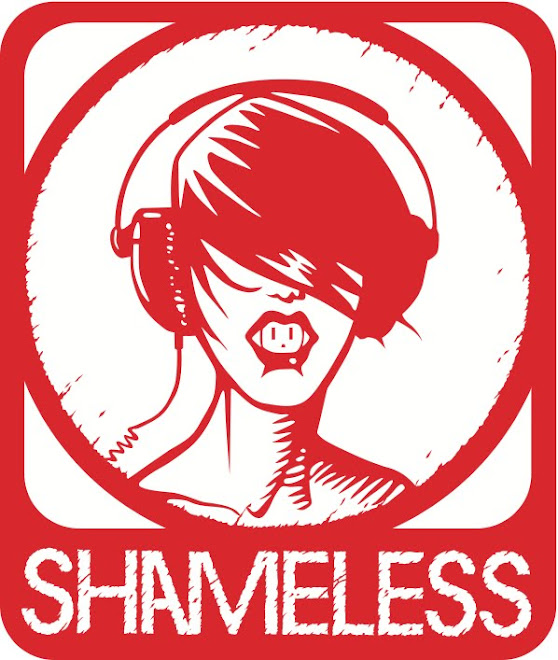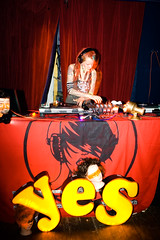
On July 3rd, Shameless and Neumo’s proudly present the Seattle installment of James Holden’s highly anticipated “DJ Kicks” world tour, with Eva, Levi Clark and myself (Adlib) opening. Holden has always been a huge influence on my DJ career, so I was honored when he interrupted his busy tour schedule last week for a brief interview. He squeezed me in at 9:00 am my time, just before departing the UK to play back-to-back bookings at the world-famous Sonar festival in Barcelona and the next night with Michael Mayer at Mondo in Madrid. We had a sprawling conversation about his DJ Kicks mix, the direction of dance music over recent years and his feelings on heading an independent dance music label. I’ve included the most important highlights below.
DK:
It's been 5 years since you last visited Seattle. In your view, what have been some of the biggest changes in your music and dance music in general during that time, particularly related to how you approach mixing and making it?
JH:
“A lot has changed in the last five years and during that time I unfortunately haven’t been in the US very much. It’s getting much harder to get a Visa to come over, so it’s been a bit weird for people (who expect a certain kind of music out of me). Everything around me has changed in the time since they (Americans) have last seen me, and I of course have changed in reaction to what’s happening around me. Any musician is like that... If you don’t get to see me very often then it’s quite a jump.
But at the same time there are always these constant threads that run through music, which is what the mix CD is all about. There’s some really old music on there and there’s music that doesn’t seem related, but it’s all the same basic idea carrying on through time. What I’m into now is what I’ve always been into -the melodic and hypnotic kind of feeling. It doesn’t matter that the sounds and the influence have changed so much because we’re all dancing to the same thing in the end.
I remember the arcs of scenes from when I was younger. You saw progressive get really big, then sort of die or go very small again. The same thing has (recently) happened with minimal techno and electro, following this similar curve of everything becoming a cliché’ and the whole thing collapsing in on itself. You start to wonder if it’s always going to be the same thing. You know, these cyclical arcs carrying on…
But dance music’s been around about thirty years now. It’s as old and trad(itional) as rock and roll was when we were really young kids.… the kids coming through now, the youngest producers, they’ve grown up with Warp Records being stuff they just know. Like Guns-N-Roses was to me, Aphex Twin can be to someone else. So they have a completely new picture of electronic music in the end. There are some really innovative people who aren’t making (any specific genre) but get lumped into that category, like Zomby with dubstep for example. They’re making rich and diverse music that can survive outside of these stupid (genre) circles that have seen clichés.”
DK:
You “discovered” several now prominent experimental and ambient techno producers like Nathan Fake, Extrawelt and Fairmont and later signed them to your label. What guides you when seeking out new music and what is a deciding factor when you decide to forge a long-term relationship with someone by bringing them into border community or collaborating with them on production?
JH:
“Well I can’t quite take credit for discovering Fairmont. He had his first release on Sender. I remember buying it on vinyl and thinking it was the most amazing thing ever. Otherwise, we just listen to the demo box and make our way through methodically and slowly. We’re a million miles behind. It’s always been that if we like the music, we’d want to work with someone. But it’s been quite nice in that everyone whose music we’ve liked has turned out to be a pretty cool person. And they all get along with each other. Everyone in the label is friends with each other, rather than it being just an outwards business… We do our best to help each other out and pass each other influences. Hearing Nathan’s half-finished tracks has always been super inspiring for Luke Abbot or me.”
DK:
It’s not only your production, but also your overall musical worldview that seems to have a ‘progressive’ bent. “The Idiots are Winning” seems like a not-so-subtle critique of contemporary society and music politics. What are your thoughts on the relationship between music and social commentary? How do you feel about contemporary music politics? What do you think this means for artistic expression and being a professional musician?
JH:
“I really do believe that the way you decide to approach making music and running a label completely affects the way the music comes out. I’m not at all interested in music that is trying to please people or be functional. That stuff comes from approaching it with a money-making or desperate for success attitude… My personal views came about initially as an accident. I felt uncomfortable working with people with had that kind of (money-making) attitude, and after a while I realized that if you treat everyone with respect and don’t patronize the crowd by thinking they’re stupid so you have to play them stupid music, then it feeds back…
It was like an evolutionary thing. When I was really young I worked with major labels and saw the disaster of trying to squeeze music out of an artist to make another sausage for the conveyer belt. That was how bad music got created, so I sought to do the opposite. I was quite lucky to have these terrible experiences when I was young because everything was right there in front of me (laughs). It became obvious how to really make music and be happy… and the ultimate results are much better with that method or outlook. I don’t think it was intended as a political thing at all, but it sort of turned out that way, which has also turned out to be an efficient or successful way for me to work.”
DK:
What were the most exciting moments when preparing and making the DJ Kicks mix? What were the biggest hurdles with the mix and the tour?
JH:
“It was really exciting preparing for this mix. I’m sort of listening for music all the time. I always have my whole library on random play and listen for things I can pull out to DJ with. But in this case I was doing it much more than normal and some of the things we found or remembered that were quite unique and fun. But there were disappointments as well. There was this really amazing Tony Conrad and Faust record from the seventies and we couldn’t clear the legal stuff. It was a bit gutting.
It’s quite hard because of the way I mix with fitting everything in key. When I’m DJing a club I have my laptop and it’s full of music so there’s always something I can work together to create the path I want to make. But when you have a limited list of tracks (as in for a CD), you have to think really carefully about where you want to start and where you’re going. In the end, you end up missing out on loads of stuff that could of gone on the CD that I love, that I just have to put it in my DJ sets…”
-------
Join us at Neumo’s next weekend for a better taste of Holden’s unique sound and approach to making dance music. Doors open at 9:00 and Holden’s extended (2+ hour) set begins at 11:30. Come early and stay late!






No comments:
Post a Comment